Amid fluttering Chinese and French flags, President Xi Jinping and his wife, Peng Liyuan, stepped off their state plane under a rainy Paris sky last May. Arriving for the first leg of a five-day tour to strengthen European ties, China’s first couple was warmly greeted by throngs of Chinese bystanders waving their country’s red flag and groups performing traditional dragon and lion dances to the sound of drums and gongs.
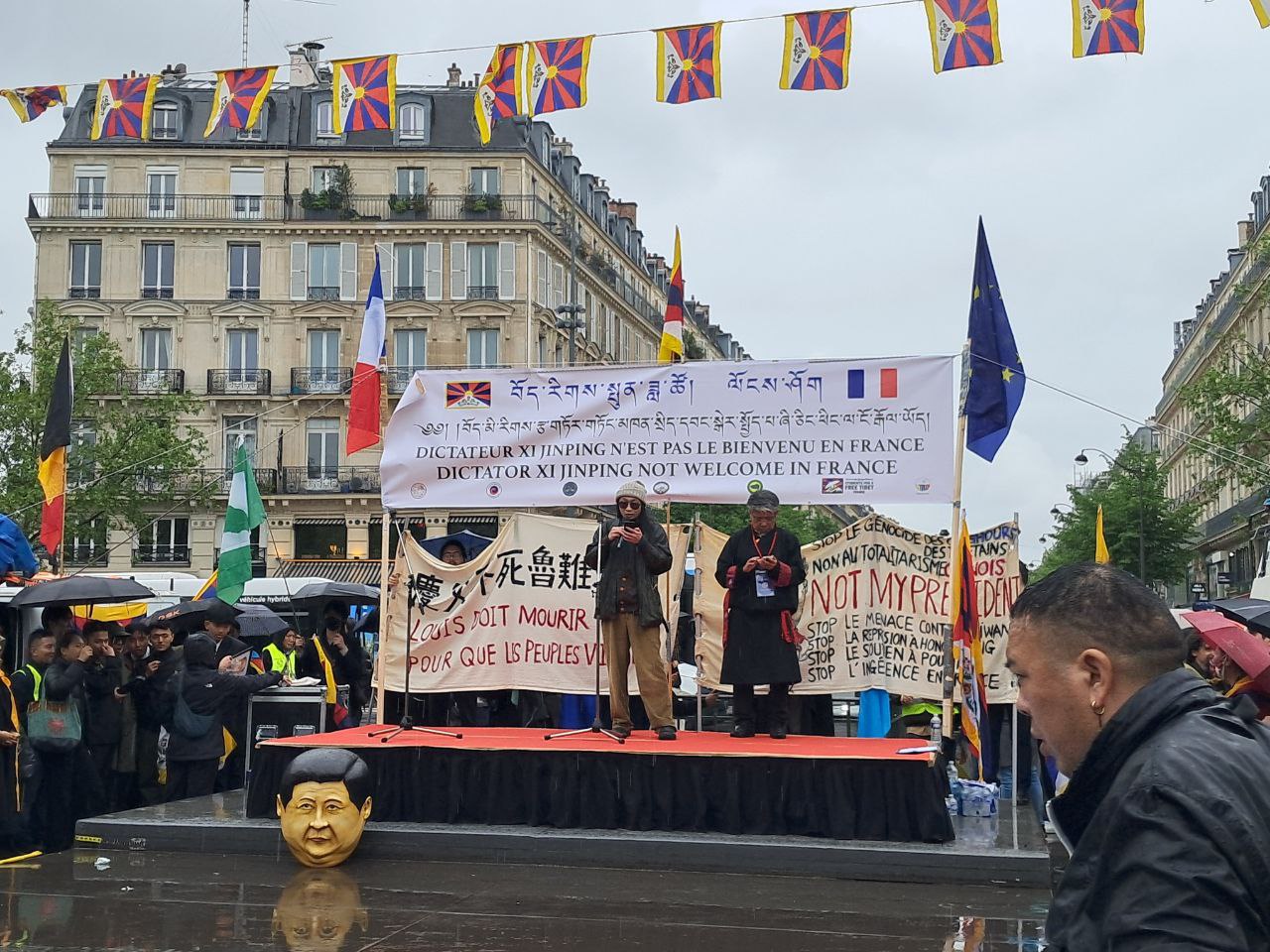
Across town, Jiang Shengda’s phone pinged. The leader of Le Front de la Liberté en Chine, a small group of Chinese activists and artists, the 31-year-old Jiang was preparing to address hundreds of demonstrators at the Place de la République, a celebrated venue for freedom of expression, protest and dissent.
The Beijing-born artist and activist had become accustomed to speaking to large crowds, often joining Uyghurs, Tibetans and Hong Kongers overseas to denounce Xi’s oppression of human rights and civil liberties, in China and abroad. But this day, he faced an agonizing dilemma.
Jiang’s mother was calling — from 5,100 miles away in Beijing.
Jiang thought he knew why: Chinese police were forcing her to place the calls, he told the International Consortium of Investigative Journalists in a recent interview.
He didn’t pick up.
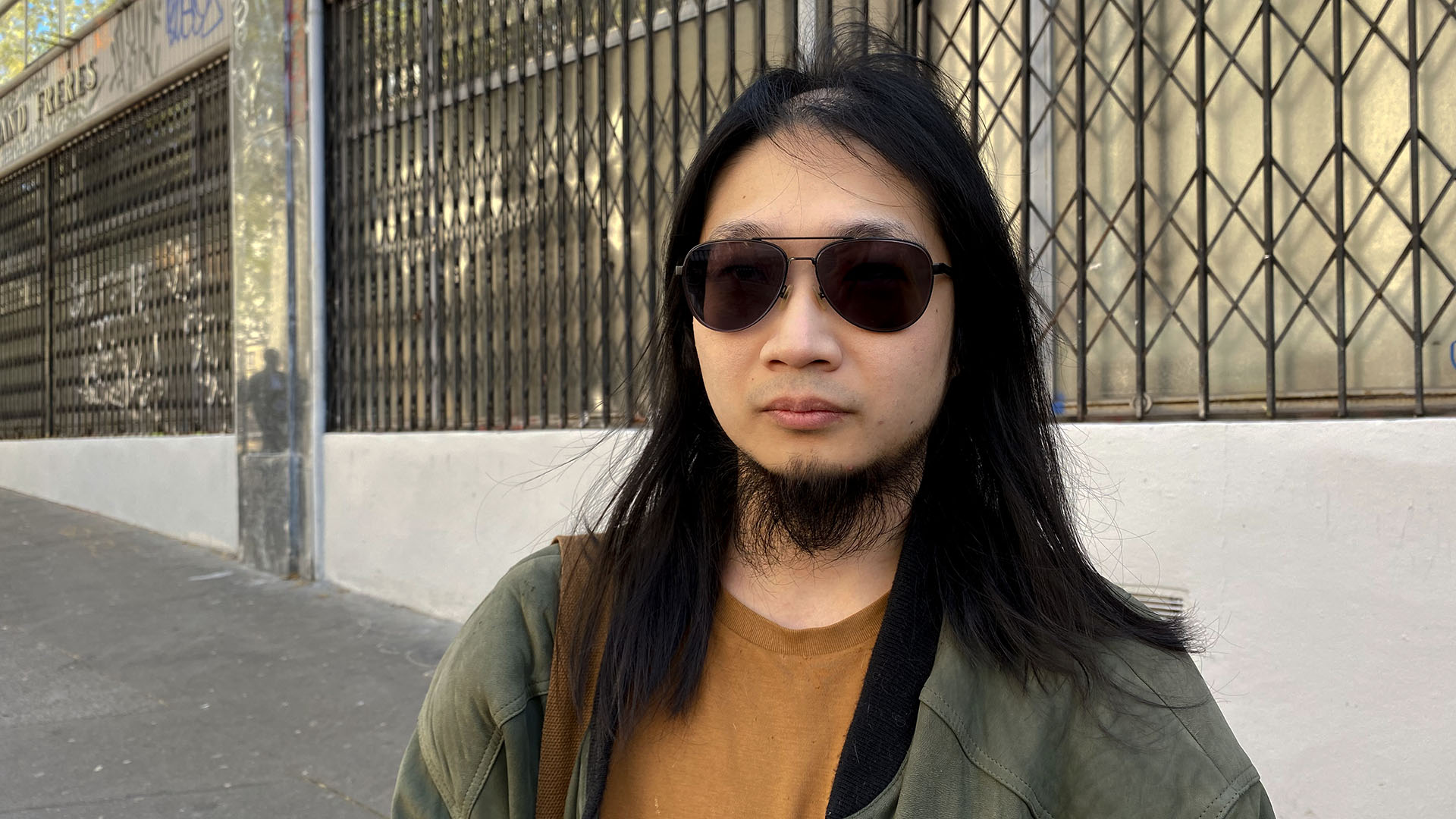
“She was definitely going to convey the [authorities’] message that I shouldn’t be involved in any public activities during Xi Jinping’s visit,” Jiang told ICIJ, his face hidden behind dark sunglasses and framed by long hair and a scruffy goatee. “And then my thought was: ‘I think it’s something that I have to do.’ ”
Jiang is one of hundreds of Chinese people living overseas that Chinese authorities have targeted directly, through hacking and surveillance — and indirectly, through interrogation of relatives, friends and even former teachers.
The pressure and control applied to the young activist is part of a sophisticated, global campaign engineered by the Chinese government to coerce and intimidate members of its diaspora in what analysts call “transnational repression.”
ICIJ and its media partners interviewed 105 people in 23 countries who, like Jiang, have been targeted by Chinese authorities in recent years for criticizing the government’s policies in public and in private.
These individuals include Chinese and Hong Kong political dissidents as well as members of oppressed Uyghur and Tibetan minorities. They have been singled out for advocating for the rights of China’s ethnic minorities and addressing other topics considered taboo by the Chinese Communist Party, or CCP, including Taiwanese and Hong Kong independence and the Falun Gong spiritual movement.
The interviews were part of China Targets, a cross-border investigation led by ICIJ that sheds new light on the vast scale of China’s global repression campaign — and the feckless response of authorities in many democratic nations where those who have been targeted now seek refuge.
The probe shows how the failure to contain Chinese authoritarianism has enabled it to reach into intergovernmental institutions such as the United Nations and Interpol, the international police organization.
“The Communist Party’s essence hasn’t changed,” said Michael Kovrig, a former diplomat from Canada and expert on China’s foreign policy. “What has changed is its capabilities. They can do more, so they do more.”
Meanwhile, Kovrig said, many democratic countries’ intelligence and law enforcement agencies lack adequate expertise to deal with cases involving the CCP’s repression and pressure tactics inside their borders. “This is a relatively new monster, and they don’t know how to fight it,” said Kovrig, who himself was detained in China from 2018 to 2021 in apparent retaliation for Canadian authorities’ arrest of a top executive of Huawei, the Chinese tech giant.
China rejects allegations of transnational repression as “groundless” and “fabricated by a handful of countries and organizations to slander China,” according to Liu Pengyu, a spokesperson for the Chinese Embassy in Washington, D.C.
Liu told ICIJ in a statement that “there is no such thing as ‘reaching beyond borders’ to target so-called dissidents and overseas Chinese.”
As part of the investigation, ICIJ coordinated reporters across five continents to interview targets and analyze their cases. ICIJ also reviewed a 2004 Chinese police textbook and confidential guidelines for domestic security officers dating to 2013. The reporters then compared the tactics described in the internal documents with the experiences of the 105 targets, as well as with secretly recorded police interrogations, and phone calls and text messages between 11 security officers in China and nine targets overseas. The comparison shows the tactics recently deployed against the subjects mirrored the guidelines on how to control individuals labeled as domestic security threats.
Half of the targets interviewed by ICIJ and its media partners said the harassment extended to family members back home, who suffered intimidation and were interrogated by police or state security officials one or more times. Several victims told ICIJ that their family members in China or Hong Kong were harassed by police shortly after they had participated in protests or public events overseas. Sixty said they believed they had been followed or were targets of surveillance or spying by Chinese officials or their proxies; 27 said they were victims of an online smear campaign, and 19 said they had received suspicious messages or experienced hacking attempts, including by state actors. Some said their bank accounts in China and Hong Kong had been frozen. Officers from both the Ministry of Public Security and the Ministry of State Security — two of the Chinese agencies with intelligence capacity — were responsible for intimidating some of the targets and their families, the testimonies show. Twenty-two people said they received physical threats or had been assaulted by civilian CCP supporters.
Most of those interviewed by ICIJ and its partners said they had not reported state-sponsored threats to the authorities in their adopted countries, explaining that they feared retaliation from China or didn’t have faith in authorities’ ability to help. Of those who had filed a report, several said police did not follow up on their case or told them that they couldn’t do anything because there was no evidence of a crime.
“Only when they see my dead body will they act,” said Nuria Zyden, a Dublin-based Uyghur, referring to the police’s response after she reported being followed by three Chinese men.
The China Targets investigation also draws on extradition records; confidential Interpol files; private communication between United Nations Human Rights Council officers and the Chinese delegation; and court filings, intelligence reports and government records from 34 countries.
Under Xi’s regime, the investigation found, the U.N. compound in Geneva has become a hostile environment where dissidents and minorities seeking to protest Beijing’s policies face harassment and intimidation from nongovernmental organizations aligned with the Chinese government. Reporters found that Chinese authorities also used Interpol to pursue not just criminals but also dissidents, businesspeople and Uyghur rights advocates, in apparent violation of the organization’s rules.
Taken together, the evidence reveals a coordinated and systematic effort by the Chinese government to neutralize dissent in all its forms by individuals the world over.
Repression playbook
After the 1989 Tiananmen Square massacre, when the Chinese military killed at least 10,000 peaceful protesters, dozens of activists fled overseas, setting up human rights organizations in New York, Paris and other cities.
“Once dissidents were out of China, they were largely out of reach; they could continue their activities,” said Katja Drinhausen, who heads the Chinese Politics & Society research program at the Mercator Institute for China Studies in Berlin. “They built networks for action abroad.”
In response, she said, Chinese authorities decided that “they wanted those organizations quiet and gone.”
Xi is committed to deepening Communist Party control over China and the diaspora. No opposition to this goal, however small or weak, is tolerated.
— Emile Dirks, a researcher at the University of Toronto’s Citizen Lab
They built a global network of cross-border repression, codifying methods to control and repress members of the diaspora in local domestic security guidelines, police textbooks and other internal documents intended for security officers in China and overseas. Some were reviewed by ICIJ.
Among the internal documents is a printed police academy textbook that includes tips on “overseas research.”
The internal entry-level textbook on “Domestic Security,” edited in 2004 by the political unit of Guangdong province’s Public Security Bureau, described overseas research as different from “foreign intelligence work” and as something that must be “long term,” “carefully deployed” and “targeted.” Overseas research is part of a “covert struggle,” and its goal, the book said, is to identify people and organizations outside China that plot, direct or finance activities that endanger the country’s socio-political stability and national security and report them to the CCP’s highest ranks.
Since Xi took power in 2012, repression against the perceived enemies of the party-state, including those abroad, has intensified, experts said. In internal communiqués, Xi himself has urged security officials to remain vigilant against “Western anti-China forces,” including dissidents.
“Xi is committed to deepening Communist Party control over China and the diaspora,” said Emile Dirks, who researches authoritarianism at the University of Toronto’s Citizen Lab. “No opposition to this goal, however small or weak, is tolerated.”
ICIJ’s China Targets investigation is based on interviews with 105 victims of China’s transnational repression in 23 countries, as well as documents from multiple sources.
The confidential files obtained by ICIJ and its partners include:
- Chinese police records that span from 2013 to 2018, provided to ICIJ by Adrian Zenz, director of China Studies at the Victims of Communism Memorial Foundation. The records, leaked from the public security bureaus of Tekes County and Shufu county, Xinjiang, include internet police bulletins and domestic security guidelines that instruct officers to detect and stop individuals and activities deemed as threats to domestic security.
- Files provided by a former agent for China’s secret police, known as Eric, to the Australian Broadcasting Corporation (ABC) and shared with ICIJ and its partners. The files, which include photographs and text messages between Eric and his superiors, detail the daily operations of Chinese spies targeting dissidents in countries such as Thailand and Cambodia.
- Internal correspondence between China’s permanent mission to the United Nations and U.N. officials from 2001 to 2020, provided to ICIJ by Emma Reilly, a former U.N. human rights officer.
- Reporters also examined confidential Interpol files and police reports and court verdicts shared with ICIJ by activists who were detained by local authorities when China’s President Xi Jinping visited their country.
An 84-slide presentation leaked from the public security bureau of Tekes County, Xinjiang, and dated 2013, instructs domestic security officers to use covert methods to detect and stop any activity that could put the party’s rule at risk.
The presentation, shared with ICIJ by Adrian Zenz, director of China studies at the Victims of Communism Memorial Foundation, likened domestic security to “a sharp weapon in the struggle against hostile forces and elements both within and outside the country.” It also urged a coordinated approach among multiple government agencies.
A chart in the presentation shows how secret police and investigators with the domestic security protection unit of the Ministry of Public Security oversaw covert operations. Grassroots police stations, where citizens can report fraud and other common crimes, as well as “social forces” — neighbors, social groups, nongovernment organizations and other civilian entities — helped “suppress and curb” politically sensitive activities.
Several pages described 18 “strategies and methods for the education, rehabilitation and control” of “key individuals” who are deemed a threat to national security and political stability.
ICIJ compared the 2013 guidelines with the testimony of the 105 victims and found that Chinese authorities have used similar methods to stifle dissent overseas.
One method in the government document was called “emotional influence of kinship,” that is, putting pressure on suspects’ family members to stop their activism. The guidelines said that parents and children can influence each other, and wives can discourage husbands from engaging in risky activities. “Affectionate work done well, on the one hand, can touch the key person.” On the other hand, “it can also prevent” the key person’s “loved ones from being pulled over,” the document said. It “kills two birds with one stone.”
Another method was called “pulling the ladder out of the house” — banning activists from returning from overseas.
During a secretly recorded interrogation obtained by ICIJ, an officer told the parent of a person living in the U.S. that if their child continued to write about politically sensitive topics, they would be forbidden from entering China again or would never be allowed to leave if they decided to return. (ICIJ is not revealing details of the incident to avoid putting the victim and their relative in danger.)
Other tactics included “cutting off oxygen” — trying to reduce the income of targets and controlling their bank accounts; “the creation of mutual suspicion and mistrust between accomplices;” internet monitoring and “making it impossible for them to communicate with the outside world”; and digging up targets’ “immoral behavior.” “No one is a saint and no one is immune to mistakes,” one guideline reads.
According to Drinhausen, these guidelines spell out a strategy that China continues to use on a large scale. “The principle and general playbook hasn’t changed, but they are operating at a very different level today,” she said. “The document also shows that the surveillance state is deeply local and personal.”
A dossier and unwanted visits
The son of a state security officer and grandson of a high-ranking government official dispatched to Inner Mongolia, Jiang had attended elite Beijing schools along with other children of the rich and powerful. He recalls a lot of people seeking favors from his powerful father, sending mooncakes and expensive crabs to the family home.
At age 18, Jiang briefly joined the China Democracy Party, a U.S.-based political group advocating constitutional democracy in China. The foray into activism landed him in serious trouble: He was arrested, charged with inciting subversion of state power and hauled off by the police.
Jiang was shocked to discover the police had compiled a thick dossier on him, including private emails and comments by a primary-school teacher. He was detained for three nights and had his passport revoked for about a year; his father was forced from his foreign intelligence post and went to work for a state-owned company, Jiang said.
In 2018, Jiang moved to France, a country he admired for its democratic traditions, its culture of social protest and dissent dating to the French Revolution and its long history as a haven for activists seeking refuge from political turmoil.
Around the time he arrived in Paris, members of the local Hong Kong community were demonstrating against new security laws back home. Inspired, Jiang later became the leader of Le Front de la Liberté en Chine and began to criticize China’s policies in his art, using the name Chiang Seeta.
He quickly drew the attention of Chinese authorities by building a symbolic wall on the sidewalk in front of the Chinese Embassy in Paris. Later, as part of a public performance art piece Jiang created, an actor wore Chinese imperial robes and Xi face masks to mock his “enthronement” ahead of the CCP’s 20th National Congress.
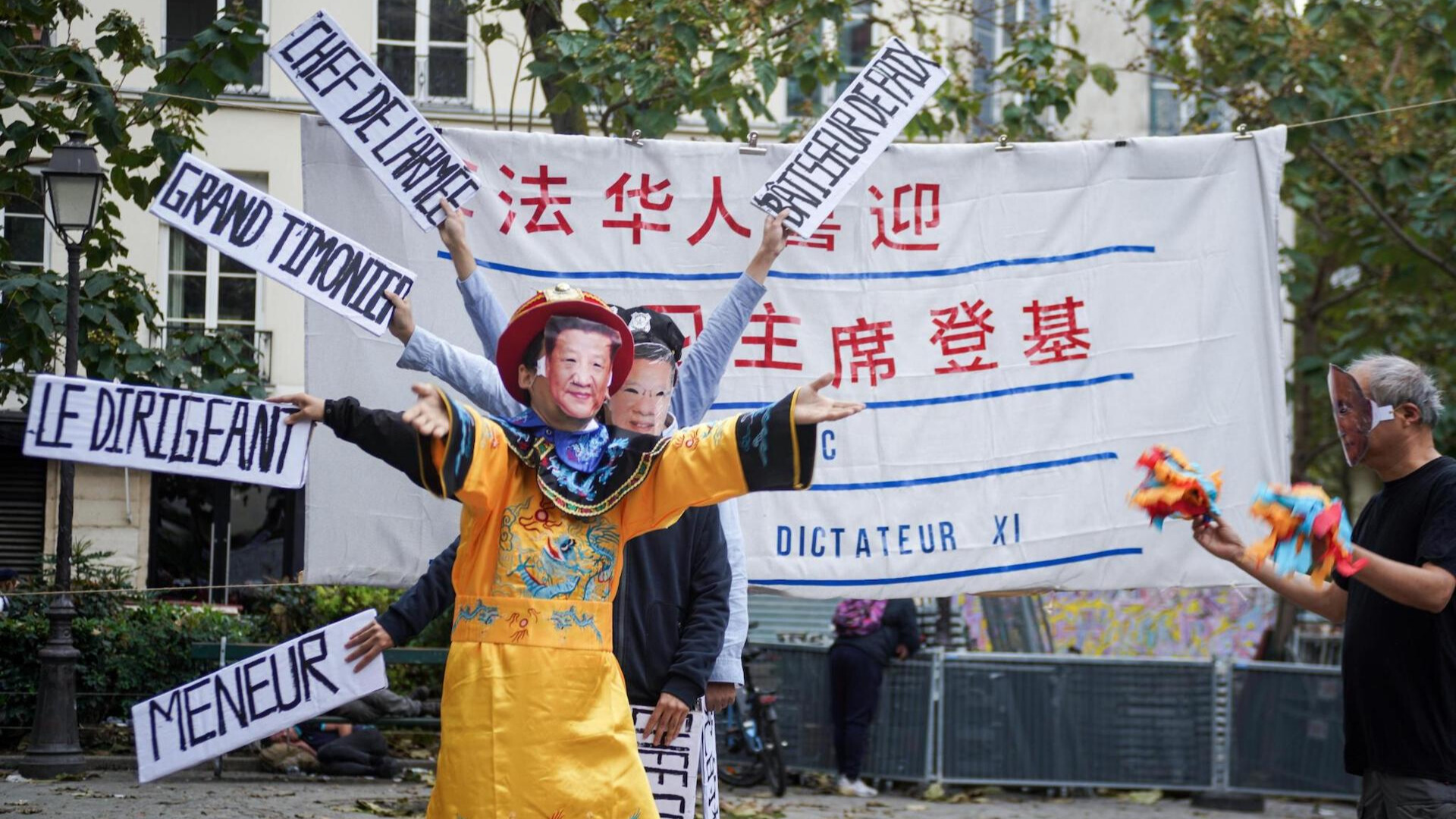
As his activism became bolder, hackers attacked his art website dozens of times while Google warned him that “government-backed intruders” were trying to steal his passwords.
Days before Xi’s 2024 trip to Paris, Jiang said, his parents called to tell him that plainclothed secret police had been visiting them for months, showing up at all hours or forcing them to meet at unofficial locations such as teahouses and restaurants’ private rooms. They hadn’t wanted to worry him, they said, but added that their continued silence was no longer an option.
On that May afternoon at the Place de la République, Jiang knew that ignoring the fresh warnings delivered by undercover operatives to his parents could risk their safety.
And yet, with his phone aglow from frantic calls placed late in the Beijing night, Jiang took the microphone to address the crowd of Tibetan and Hong Kong protesters. “They [the Chinese police] have demanded that we keep quiet during Xi Jinping’s visit to France. … Such threats are part of transnational repression … that is just an extension of [China’s] tyranny,” he said. “That’s why communication between different communities is so valuable in the face of China’s long-standing policy of [division].”
Shortly after his speech, Jiang called his parents. He learned that while he was about to get on stage, officers had called his parents’ home demanding the father meet them in the middle of the night. They warned: “Your kid used to do certain things overseas that are against Chinese laws. We could turn a blind eye to it. But this time the big leader comes [to France]. If he does something embarrassing for the big leader” during Xi’s visit, “it’d be difficult for us to handle.”
Jiang told ICIJ that Chinese authorities used the same tactics with the families of other group members. As a result, some have quit their activism and left the group, he said.
“Even if we live in a free country, we are still afraid to speak up and suffer harassment from the party,” Jiang told ICIJ.
Wanted person
Since Xi’s rise to power in 2012, advocates, journalists and academics have documented thousands of transnational repression cases at the hand of Chinese authorities, an ICIJ review of reports by human rights organizations, media outlets and other research shows.
Technology to “manage public opinion,” infiltrate dissidents’ computers and steal private information from users of the X social media platform has also enabled authorities to quickly target a larger number of people and to automate transnational repression.
The Chinese government’s repression campaign also relies on private security firms, professional hackers, staff of Chinese nongovernmental organizations with access to U.N. proceedings, retired or corrupt law enforcement officials in foreign countries and members of China’s diaspora with links to the CCP-linked United Front Work Department. Authorities have also turned victims into perpetrators, forcing or luring dissidents and members of ethnic minorities to spy on their peers overseas, court records show.
Meanwhile, host nations struggle to protect government targets against attacks and intimidation, ICIJ found.
With a few exceptions, targets of China’s repression told ICIJ that law enforcement officers where they live frequently dismiss their complaints of surveillance and stalking. Diplomatic responses remain timid, allowing China to become more aggressive, activists said. In Nepal, Thailand and other countries dependent on Chinese economic power, local law enforcement has helped Chinese authorities prevent protests and in some cases even locate and arrest dissidents, ICIJ found.
Last year, Carmen Lau, a 30-year-old Hong Konger in exile, stayed up late in her apartment near London to listen as Hong Kong police held a Christmas Eve press conference to announce restrictions on democracy activists in exile.
She heard her name.

A government official announced arrest warrants against six pro-democracy activists; Lau, a former Hong Kong district council member and democracy and human rights advocate, was one of them. Authorities announced they had charged her with “colluding with foreign forces” and “inciting secession,” and placed a bounty worth about $130,000 for her capture.
“It changes my daily life a lot,” Lau said. “Mentally I’m still processing and still trying to adjust my lifestyle or my social life.”
Lau is one of hundreds of Hong Kongers who participated in the pro-democracy movement that was brutally repressed by the city’s authorities and culminated in 2020 with a new security law that heavily curtails human rights and civil liberties. She was charged in 2021 with inciting voters to cast a blank vote as a means of protesting an election activists viewed as rigged.
Lau was among thousands who have fled to the U.K., the U.S. and other countries; she is one of 19 who are currently on Hong Kong’s bounty list.
Hong Kong authorities froze her bank account — along with those of 126,000 residents who left the city. In February, two days after Lau participated in a protest against a new Chinese Embassy in London, Hong Kong national security police took in her aunt and uncle for questioning. The officers showed up at their door at 7 a.m. and kept them at a station for about five hours, according to local media. Nine days later, police took in another aunt “to assist with their investigation,” Hong Kong media reported.

Lau told ICIJ that she no longer has any contact with her family back home, but she is still worried for them — and for her personal safety. “It was [a] complicated feeling … because I know that what I’m doing is right,” she said. “But then, because of my decision or my determination, I put my relatives and friends [in] danger.”
While Lau was away on a trip in March, five of her neighbors in a town near London received a letter from an anonymous sender in Hong Kong encouraging them to hand her over to the Chinese Embassy and collect the bounty. The letter included a recent photo of Lau labeling her a “Wanted Person.”
In a statement to ICIJ, a spokesperson for Hong Kong’s Security Bureau said the government will “take every measure” to pursue those suspected of having violated Hong Kong national security laws who have fled overseas, “including cutting off their funding sources, so as to prevent and suppress them from continuing to engage in acts and activities endangering national security.”
The spokesperson noted, however, that the government does not send anonymous letters and cautioned “to verify the authenticity of such letter(s).”
Today, Lau wears a mask in public, minimizes her social circle and often finds herself looking over her shoulder. She has received rape and death threats from anonymous accounts on X and suspects that two men followed her and took photos while she was at a Lunar New Year event in London.
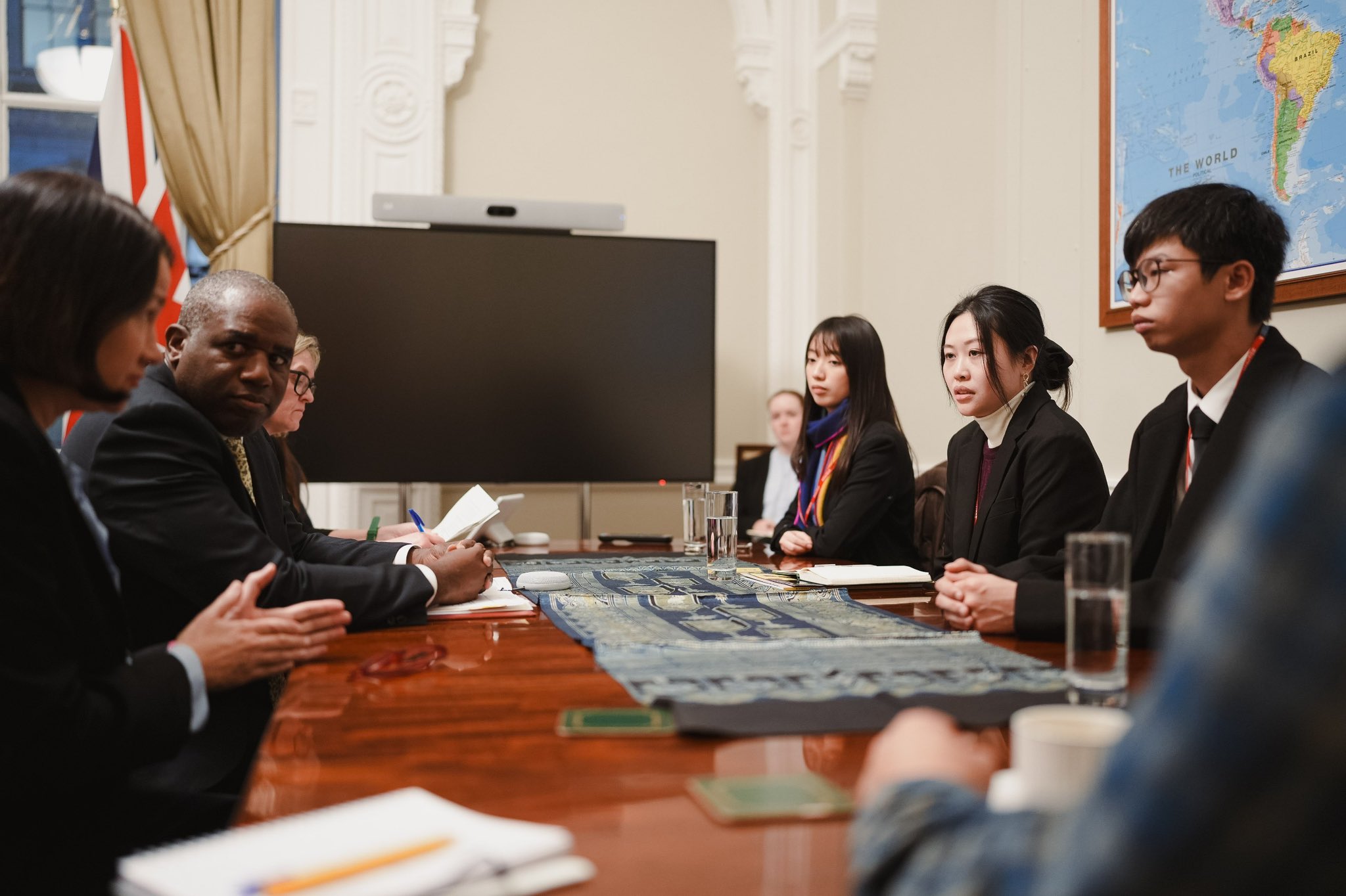
She said U.K. authorities have been little help, despite Foreign Secretary David Lammy’s statement last year that the British government “will not tolerate any attempts by foreign governments to coerce, intimidate, harass, or harm their critics overseas, especially in the UK.”
After Hong Kong authorities issued the bounty, an officer from London metropolitan police’s anti-terrorism unit advised Lau not to participate in protests and minimize online activity, she said. Police in her town suggested that she install a surveillance camera outside her apartment and get a personal alarm. Officers told her to call 999, the emergency number, if she suspected trouble but offered no additional protection, she said. (The police declined to comment on Lau’s case.) She has talked about the state-sponsored threats against Hong Kongers in official meetings with Lammy and other high-ranking officials but believes those meetings are mostly “lip service and a photo op,” she said.
Lau said the British government should formally define transnational repression, set up a monitoring or reporting mechanism and work more closely with other democracies to find patterns used to target their people abroad.
For now, she said, “I don’t feel safe at all.”
‘Semi-sleeping’
China analysts and former intelligence officers and diplomats interviewed by ICIJ said that democratic nations have been slow to recognize the Chinese government’s transnational repression strategy — leading to long-lasting consequences.
Jonas Parello-Plesner, a former senior adviser on China for Denmark’s Foreign Ministry who was approached by a Chinese agent to become a spy in 2011, said the “awakening” to the problem started with the countries with the largest Chinese communities, including the U.S., Australia and New Zealand.
“There is a growing awareness in some quarters about this issue,” Parello-Plesner said. “But I don’t think there’s a completely concerted action that is capable of dealing with this.”
A big shift in public understanding came in 2022, when Safeguard Defenders, a rights group, published a widely read report revealing that Chinese business associations and other civilian community service groups in dozens of cities around the world were acting as secret surveillance hubs.
Many countries, as well as the European Union, showed a new awareness of the implications of China’s control of its diaspora.
Since then, the European Parliament has called for a harmonized response of EU member states to transnational repression by “illiberal regimes,” including China. Switzerland investigated China’s oppression of Tibetans and Uyghurs living there and concluded that transnational repression is a threat to democracy, much like terrorism, because it erodes freedom of action and expression. And in the U.K., a government committee recently heard experts and victims as part of an inquiry into the issue.
But according to Parello-Plesner, democratic nations still lack the understanding and tools to deal with China’s influence and interference.
“I think we’re still semi-sleeping,” he said.
‘Do not think about coming home’
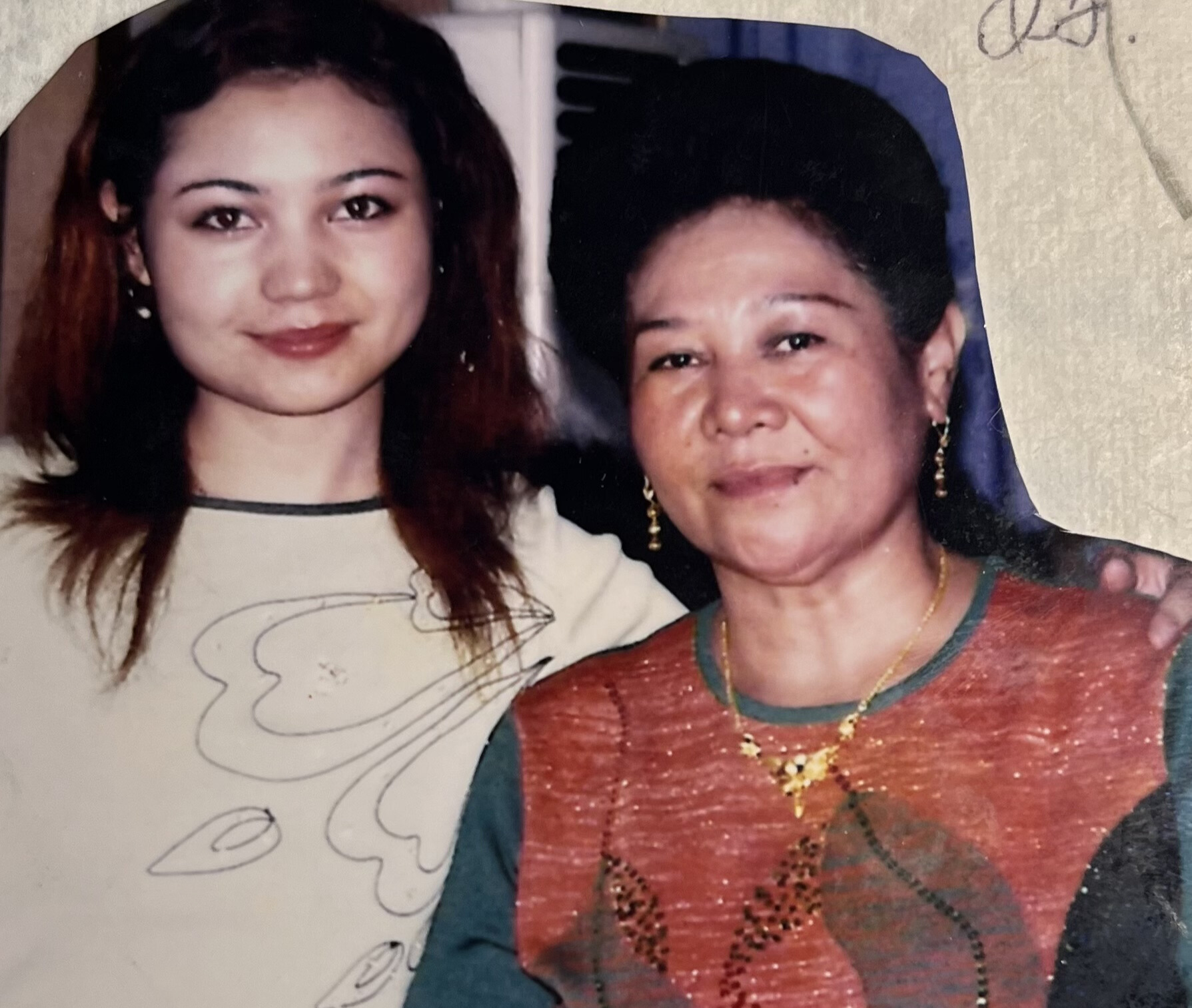
Nuria Zyden keeps a photo of her mother on her desk. She doesn’t expect to see her again.
Now 43 and living in Dublin, Zyden grew up amid peach and apricot trees in Kashgar, in China’s northwestern Xinjiang region, the center of the Muslim-majority Uyghur community that has suffered institutionalized discrimination and marginalization for generations. She remembers celebrating Eid with her mother, along with 26 cousins at her grandmother’s place in the countryside, dyeing eggs and butchering a sheep for the feast.
Zyden moved to Ireland 15 years ago to escape anti-Uyghur sentiment in China and pursue a career working for a multinational corporation. In 2014, the Chinese government imposed restrictions in Xinjiang after a deadly blast at a railway station that Xi called a “terrorist attack.”
As Zyden became more active in international Uyghur rights groups, her family became increasingly worried and finally asked her to cut ties.
Her mother had told her: “Do not think about coming home.”
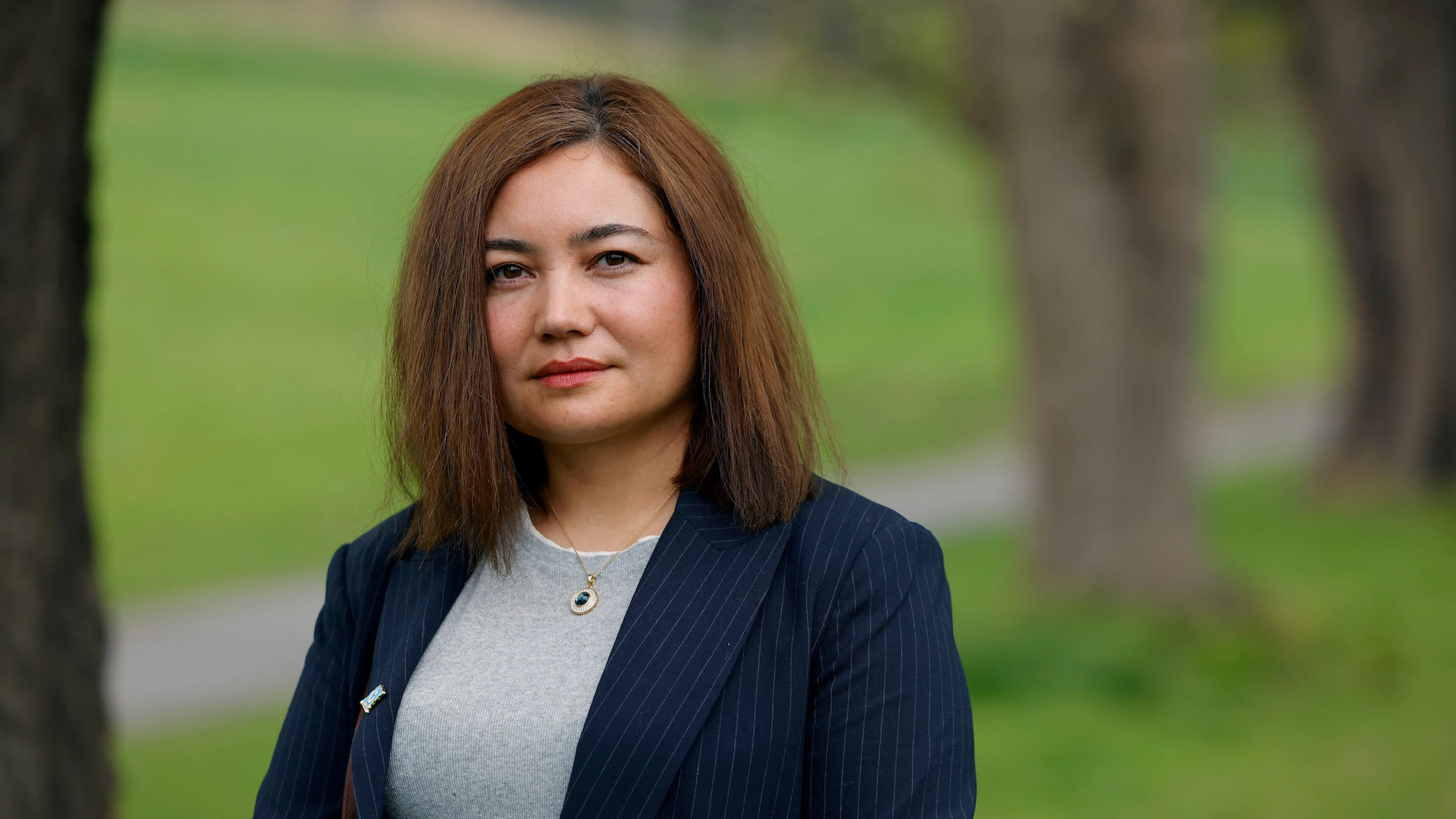
Since then, advocates and researchers have asserted that the Chinese government has perpetrated human rights violations including mass imprisonment of more than 1 million Uyghurs, forced labor and other abuses under the pretext of combating terrorism and religious extremism. A 2022 U.N. report concluded that documented abuses “may constitute crimes against humanity.”
And while the Chinese government has relentlessly targeted pro-democracy Chinese people everywhere, it has displayed a particular zeal for Uyghur activists, whom it accuses of fostering a separatist movement and, in some cases, acts of terrorism, internal government documents show.
In October, Zyden traveled to Sarajevo, Bosnia and Herzegovina, where 176 delegates were gathering for the general assembly of the World Uyghur Congress (WUC), a Uyghur rights organization. Her trip took an unexpected turn.

During her layover in Frankfurt, Germany, she was on a minivan transporting passengers to the airport gate when she noticed two Chinese men who “looked like they were on a mission.” Later at her hotel in Sarajevo, she heard shouting and turned to see them again — in an argument with Adiljan Abdukerim, a conference organizer who had confronted the men in Chinese for filming attendees with their phones.
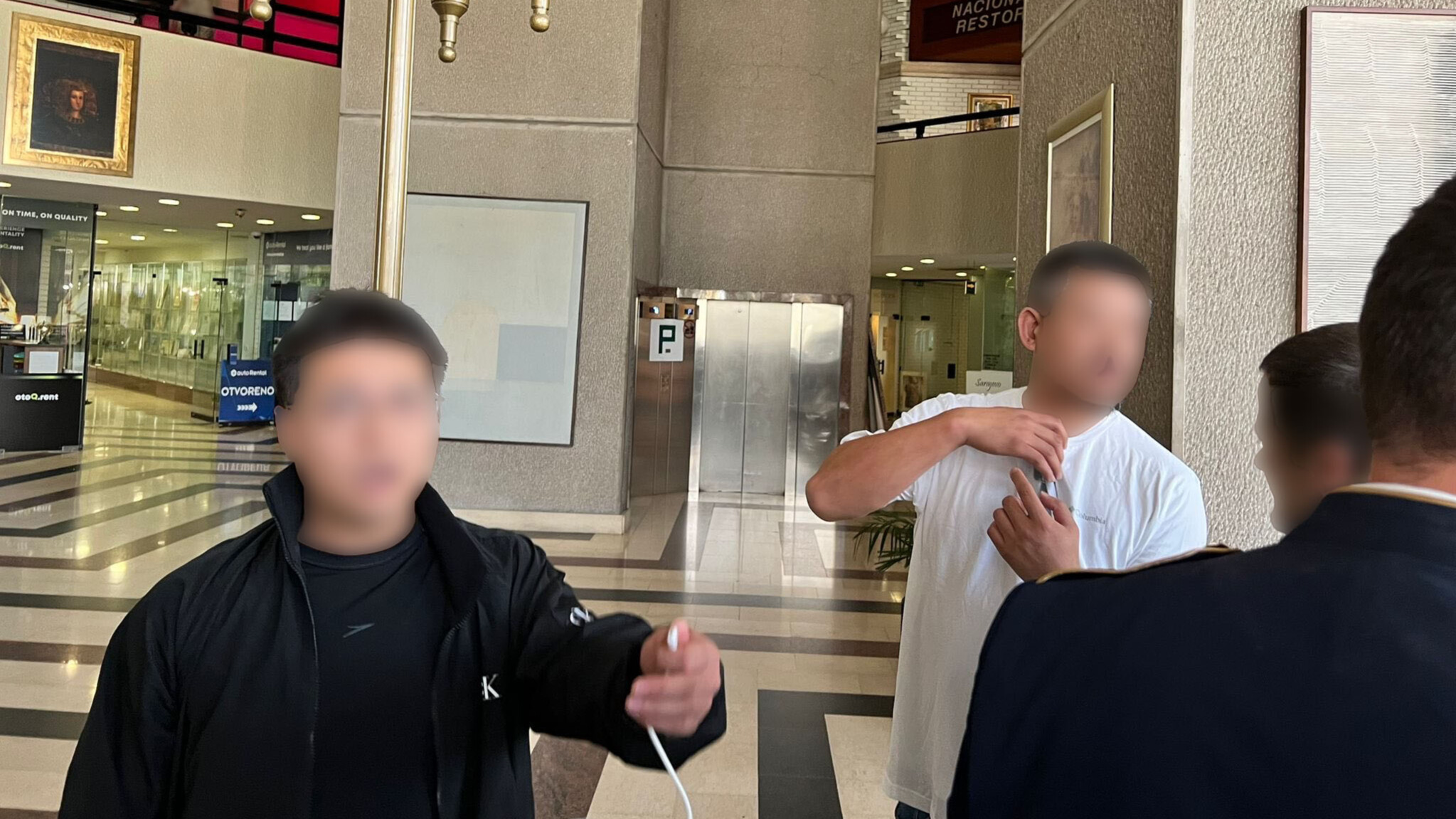
“You guys are very cocky here,” one of them barked at Abdukerim, the organizer told ICIJ. “We know how to deal with you.”
Abdukerim shot back: “Do you think this is China?”
Hotel security intervened and the men, who remain unidentified, left.
The organizers also received a video featuring masked men purporting to be Islamic terrorists threatening WUC leaders and anonymous emails featuring photos of guns and of the hotel where they were gathering. Bosnia’s federal police told ICIJ that it’s investigating the threats.
After returning to Ireland, Zyden received a surprise phone call. After 10 years of silence, her mother was on the line.
Using a WeChat number that her mother said was provided by a local foreign affairs officer in Kashgar, the mother said she had heard Zyden had been at the WUC event in Sarajevo.
“Why did you do that?” she asked.
”Why don’t you think about our safety?” chimed in a relative sitting beside her mother.
Zyden insisted she had done nothing wrong and demanded to talk to the officials who she believed had forced the call.
In January, Zyden received a call from a Kashgar officer. “What do you want from me?” she asked. “What are you expecting?” Authorities had found out about her activism, he told her, and interrogated her mother, who had then fallen ill. Chinese security officers keep a database of individuals linked to the WUC, as well as their relatives, according to an analysis of government documents by Zenz, the expert on Xinjiang policy.
“Relax,” Zyden recalls the officer saying. “He was [acting as] the one gently coming to sort out the problem, as though he wanted to protect my family, and now my family is kind of under his protection.” She got “very upset.”
Zyden said she reported everything to Irish police — including the officer’s call and her encounter with the two men who she suspected had followed her all the way to Bosnia. “I wrote down everything,” she told ICIJ.
Representatives from the Irish police, An Garda Síochána, told ICIJ partner the Irish Times that they are investigating Zyden’s complaint.
“I’m still struggling,” Zyden said. Part of her says “leave everything,” she said, “but another side says ‘If you are being quiet, they will take more. You have to speak out. You have to fight back.’ ”
‘We could find you anytime’
Until recently, many activists and victims interviewed by ICIJ looked up to the U.S. as the most active country fighting transnational repression. The Federal Bureau of Investigation encourages anyone with information about the subject to call its hotline. Its special agents have helped indict Chinese officers working for China’s Ministry of Public Security and the Ministry of State Security. But even in the U.S., government agencies struggle to define transnational repression and “are unable to quantify the full extent of the issue,” according to a 2023 report by the U.S. Government Accountability Office.
Law enforcement officers in democratic nations say their ability to protect victims is limited because China uses proxies and indirect methods to make it difficult to link the harassment to a state actor.
At a parliamentary hearing last year, Australian Federal Police Deputy Commissioner Krissy Barrett acknowledged that foreign interference — which includes transnational repression — is “one of the most complex” crimes they investigate. The perpetrators, she said, often use “extremely good trade craft” and “know how to operate in a way that does either remove them from … direct investigation, or evade some of our investigative tactics.”
Dutch prosecutors lamented similar challenges when investigating 24 reports of harassment, intimidation and other threatening acts allegedly carried out by Chinese government officers or proxies against victims living in the Netherlands. In a 2020 report, the prosecutors concluded that the alleged offenders were in China, where Dutch authorities have no jurisdiction, making it impossible for them to bring charges.
After the harrowing phone calls from his father during Xi’s Paris visit last year, Jiang, the artist and activist, said the threats to his family abruptly ended. Life returned to normal.
But in March, Jiang checked one of the four phones he uses to securely communicate with people in China and noticed a message.
It was from his father. He returned the call and learned that security officers, including one who had talked to his parents before, had wanted to meet with his father.
The officers bought Jiang’s father a drink at a cafe in Beijing and in their usual polite tone made clear that his son should stop collaborating with a well-known activist based in Italy known as “Teacher Li,” who had amassed 1.9 million followers on X since he started posting about demonstrations and discontent from within China early in the COVID-19 pandemic. (Jiang is filming a documentary about Li and contributing to the activist’s project to expose exploitative labor practices in China.)
The officers told Jiang’s father that his son should not be “implicated” with Li because he is a “key individual,” the government lingo for targets deemed to be potential threats to society.
They also had a message for Jiang: “If necessary they will call you or meet you where you are,” his father said.
Jiang got the message: “I’d interpret that to mean that, ‘If we wanted to find you, we could find you anytime we wanted to.’”
Contributors: Colm Keena (The Irish Times); Sophia Stahl and Maria Christoph (paper trail media/ZDF/DER SPIEGEL); Kirsi Skön (Yle), Kristof Clerix (Knack), Tobias Andersson Åkerblom (Göteborgs-Posten); Géraldine Hallot and Maxime Tellier (Radio France); Simon Leplâtre (Le Monde); Echo Hui (Australian Broadcasting Corporation); Paula Penfold (Stuff); Maeve McClenaghan and Tom Burgis (The Guardian); Fabio Papetti (IrpiMedia); Jiyoon Kim (Newstapa); Sylvain Besson (Tamedia); Pelin Ünker (DW Turkey); Sebastian Kjeldtoft (Politiken); Tamsin Lee-Smith, Jelena Cosic, Nicole Sadek, Agustin Armendariz, Denise Ajiri, Jesús Escudero, Fergus Shiel, Annys Shin, Whitney Joiner, David Rowell, Dean Starkman, Delphine Reuter, Karrie Kehoe, Carmen Molina Acosta, Sam Ellefson, Kathleen Cahill, Richard H.P. Sia, Angie Wu, Tom Stites, Chris Worthington, Hamish Boland-Rudder, Joanna Robin, Jane Tang and anonymous (ICIJ).
